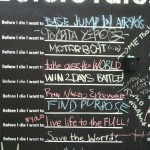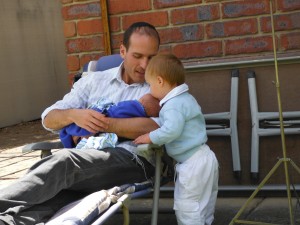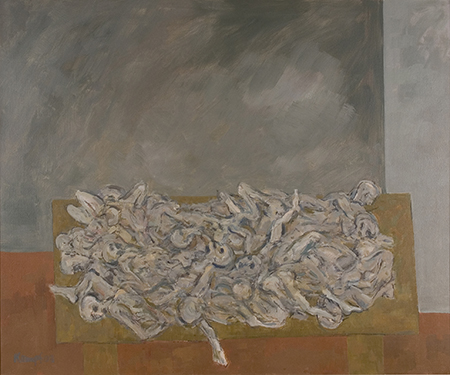New Years day is a time many people revise their resolutions and set goals for the coming year. Some have a list of things they would like to do before they die, often known as a ‘bucket list.’ Every year they select a handful of items from their list and try to get them done. Some few people are very successful in achieving the goals they set, while the vast majority end up setting the same goals year after year. Many will die having not done the things on their bucket list.
Rosh Hashana, the Jewish new year has always been my time to set revise. To think about the past year and to brain storm ideas of what I’d like to achieve in the coming year. My birthday is shortly after Sukkot which comes roughly one month after Rosh Hashana. During this period of time between Rosh Hashana and my birthday, I’ll reflect on my goals. By the time my birthday comes around I’ve got a good idea of what I want to do.
Thus said, anytime is a good time to revise ones goals be it January first or February first. In fact, reviewing your goals every day is important to make sure you are well aware of them and to actively schedule in time to get them done.
Around a week ago a friend shared an idea with me which because of, I spent January first doing a complete revision of my goals. The idea shared was: ‘Don’t set goals. Implement life style changes!’
At first it sounded fairly simple, but after thinking it through, I realized this is the answer to achieving some of my goals that have been around for a long time.
For example, say you put on your goal list ‘Run a marathon.’ A year goes bye and you’ve not done it. Many will tell you it is because the goal was to big and not manageable. You need to break it down to say ‘Run 5km.,’ and from there, 10km, 20km etc. I’ve tried this method in the past to various success. The problem I found with it, is that it often is not inspiring. You want to after all run a marathon not 5km.
With implementing lifestyle change, you could do the following. For the next 90 days. Walk/run for 30 minutes twice a week. This should be fairly easy. Then for 90 days walk/run 3 times per week for 45 minutes. Then for 90 days, walk run 4 times per week for 45 minutes. Then for 90 days run 4-5 time per week and you are now ready to run marathon!
A typical new years goal people set is to loose weight. This goal usually repeats its self year after year. Forget the goal and implement life style changes and you will automatically loose the weight. The idea is to do things for 90 days so that they become a habit and part of the way you live.
- Drink water in the morning instead of coffee
- Eat a piece of fruit for morning and afternoon snack instead of a cookies or chips
- Use low fat milk or mayonnaise
If you make these kinds of changes to your lifestyle figure 3 changes in a n area of life you are trying to improve, you will be implementing 12 changes over the year. it is inevitable that the goal will be reached without having to think about it.
See here for ideas to put on your Jewish bucket list.
Read More

 How to Keep Kosher While Traveling
Finding Food: There are three types of places you may find yourself:
Developed countries like: Canada, United States, and Australia. In most developed Western countries you can buy almost anything in a supermarket aside from meat and dairy products. A vegetarian and vegan self-caterer would have no...
How to Keep Kosher While Traveling
Finding Food: There are three types of places you may find yourself:
Developed countries like: Canada, United States, and Australia. In most developed Western countries you can buy almost anything in a supermarket aside from meat and dairy products. A vegetarian and vegan self-caterer would have no...
 How to Keep Shabbat Anywhere
Toilet Paper: Remember to tear toilet paper. (Especially in India!!!)
Lights: Leave the bathroom light on. For high-tech places where you use your entry card to keep the lights on, I just leave the room before Shabbat and forget my key and leave the lights and air-conditioning on. I tell them at the front desk...
How to Keep Shabbat Anywhere
Toilet Paper: Remember to tear toilet paper. (Especially in India!!!)
Lights: Leave the bathroom light on. For high-tech places where you use your entry card to keep the lights on, I just leave the room before Shabbat and forget my key and leave the lights and air-conditioning on. I tell them at the front desk...
 Camping on Shabbat
How to: Build an Eruv, Bake Bread, go to the Toilet, and More
A Practical Guide to Camping Over Shabbat.
Camping on Shabbat requires extra preparation and effort, but is not that difficult once you get the hang of it – and Shabbat can be a highly rewarding experience when spent in nature. This book will show you how...
Camping on Shabbat
How to: Build an Eruv, Bake Bread, go to the Toilet, and More
A Practical Guide to Camping Over Shabbat.
Camping on Shabbat requires extra preparation and effort, but is not that difficult once you get the hang of it – and Shabbat can be a highly rewarding experience when spent in nature. This book will show you how...
 “The jungles of Borneo, Mt Kilimanjaro in Africa, a Thai boxing camp in Thailand… this guy manages to keep kosher and observe Shabbat.”
I have been traveling since 1997 and never really stopped. My house is my backpack where I have everything I need; clothing, a tooth brush, juggling balls, and a pair of small Tefillin.
People...
“The jungles of Borneo, Mt Kilimanjaro in Africa, a Thai boxing camp in Thailand… this guy manages to keep kosher and observe Shabbat.”
I have been traveling since 1997 and never really stopped. My house is my backpack where I have everything I need; clothing, a tooth brush, juggling balls, and a pair of small Tefillin.
People...










